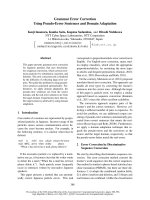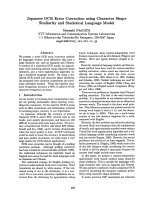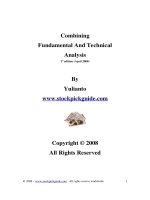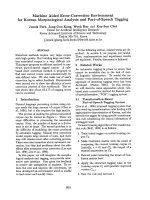EVIEWS tutorial Cointegration and error correction potx
Bạn đang xem bản rút gọn của tài liệu. Xem và tải ngay bản đầy đủ của tài liệu tại đây (2.83 MB, 16 trang )
1
1
© Roy Batchelor 2000EVIEWS Tutorial 1
EVIEWS tutorial:
Cointegration and error correction
Professor Roy Batchelor
City University Business School, London
& ESCP, Paris
© Roy Batchelor 2000EVIEWS Tutorial 2
EVIEWS
r On the City University system, EVIEWS 3.1 is in
Start/ Programs/ Departmental Software/CUBS
r Analysing stationarity in a single variable using VIEW
r Analysing cointegration among a group of variables
r Estimating an ECM model
r Estimating a VAR-ECM model
2
2
© Roy Batchelor 2000EVIEWS Tutorial 3
The FT500M workfile
© Roy Batchelor 2000EVIEWS Tutorial 4
Data transformation
r Generate a series for the natural log of the FT500 index (lft500)
r Test for stationarity in
– the level of this series
– the first difference of this series (dlft500)
r Results show that lft500 is an I(1) variable
3
3
© Roy Batchelor 2000EVIEWS Tutorial 5
Generate ln(FT500)
© Roy Batchelor 2000EVIEWS Tutorial 6
Augmented Dickey-Fuller (ADF) Test
4
4
© Roy Batchelor 2000EVIEWS Tutorial 7
ADF results: level
The hypothesis that
lft500 has a unit root
cannot be rejected
The hypothesis that
lft500 has a unit root
cannot be rejected
© Roy Batchelor 2000EVIEWS Tutorial 8
ADF test results: first difference
The hypothesis that
the first difference of
lft500 has a unit root
can be rejected.
So lft500 is I(1)
The hypothesis that
the first difference of
lft500 has a unit root
can be rejected.
So lft500 is I(1)
5
5
© Roy Batchelor 2000EVIEWS Tutorial 9
Cointegration: two variables
r The variables lft500 (log of stock index) and ldiv (log of
dividends per share) are both I(1)
r We can test whether they are cointegrated
– that is, whether a linear function of these is I(0)
– An example of a linear function is
lft500
t
= a
0
+ a
1
ldiv
t
+ u
t
when u
t
= [lft500
t
- a
0
- a
1
ldiv] might be I(0)
r The expression in brackets [] is called the cointegrating vector,
which has normalised coefficients [ 1, -a
0
, -a
1
]
© Roy Batchelor 2000EVIEWS Tutorial 10
Form new group
6
6
© Roy Batchelor 2000EVIEWS Tutorial 11
Common trends?
© Roy Batchelor 2000EVIEWS Tutorial 12
Engle-Granger: first stage regression
Don’t worry
about this
Don’t worry
about this
7
7
© Roy Batchelor 2000EVIEWS Tutorial 13
Save first-stage residuals (u
t
= RES)
© Roy Batchelor 2000EVIEWS Tutorial 14
Engle-Granger:stage two (ECM) regression
About 7% of
disequilibrium
“corrected” each
month
About 7% of
disequilibrium
“corrected” each
month
8
8
© Roy Batchelor 2000EVIEWS Tutorial 15
General model: stage one (I(1) variables)
© Roy Batchelor 2000EVIEWS Tutorial 16
General model: stage two
9
9
© Roy Batchelor 2000EVIEWS Tutorial 17
Specific model:stage two
© Roy Batchelor 2000EVIEWS Tutorial 18
1-month ahead forecasts of lft500 from first
stage regression
10
10
© Roy Batchelor 2000EVIEWS Tutorial 19
1-month ahead forecasts of dlft500 from
the second stage ECM
© Roy Batchelor 2000EVIEWS Tutorial 20
1-month ahead changes in lft500:
actual v. forecast
11
11
© Roy Batchelor 2000EVIEWS Tutorial 21
Johansen method: make group of
associated I(1) variables (lft500, ldiv)
© Roy Batchelor 2000EVIEWS Tutorial 22
Set up Johansen procedure
12
12
© Roy Batchelor 2000EVIEWS Tutorial 23
Johansen test for cointegrating vector(s)
© Roy Batchelor 2000EVIEWS Tutorial 24
Cointegrating vector (cf. First stage
regression)
13
13
© Roy Batchelor 2000EVIEWS Tutorial 25
Set up VAR-ECM
© Roy Batchelor 2000EVIEWS Tutorial 26
Cointegrating vector of both endogenous
I(1) variables
14
14
© Roy Batchelor 2000EVIEWS Tutorial 27
VAR-ECM-X models for both endogenous
variables
About 10% of
disequilibrium
“corrected” each month
by changes in stock
index lft500
About 10% of
disequilibrium
“corrected” each month
by changes in stock
index lft500
About 2% of
disequilibrium
“corrected” each month
by changes in dividends
ldiv
About 2% of
disequilibrium
“corrected” each month
by changes in dividends
ldiv
Exogenous I(0)
variables
affecting stock
index and
dividends
Exogenous I(0)
variables
affecting stock
index and
dividends
© Roy Batchelor 2000EVIEWS Tutorial 28
Forecasting: make VAR-ECM model
15
15
© Roy Batchelor 2000EVIEWS Tutorial 29
Dynamic forecasting: 1 year ahead
© Roy Batchelor 2000EVIEWS Tutorial 30
Stock index and dividend forecasts, 1996
16
16
© Roy Batchelor 2000EVIEWS Tutorial 31
Updated model (1975-98)
© Roy Batchelor 2000EVIEWS Tutorial 32
Forecasts for 1999-2000: a Crash coming?









